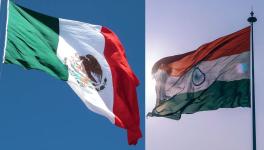COVID-19: US Statement on TRIPS Waiver Welcome, Rocky Road Still Ahead
Representational use only.
In a significant development, on May 5, 2021, the US administration under Preisdent Biden extended support to the TRIPS waiver proposal mooted by India and South Africa in October 2020. The proposal demanded a temporary waiver of certain TRIPS obligations on copyrights and related rights, industrial designs, patents, and the protection of undisclosed information in relation to the prevention, containment or treatment of COVID-19.
It took more than seven months and sustained pressure from all possible quarters – civil society organisations, both domestic and international, Democratic lawmakers, former Heads of State and Government and Nobel Laureates, and more than 100 developing and less developed countries – for the United States administration to relent and agree to support the proposal.
However, if one looks at the carefully worded statement by the United States Trade Representative (USTR) Katherine Tai, it said: “The Administration believes strongly in intellectual property protections, but in service of ending this pandemic, supports the waiver of those protections for Covid-19 vaccines (sic)”. The statement only talks about vaccines, though it should include diagnostics, therapeutics and other medical products as mentioned in the proposal. The USTR statement, while promising active participation in text-based negotiations at the World Trade Organization (WTO), noted: “Those negotiations will take time given the consensus-based nature of the institution and the complexity of the issues involved.”
Welcoming the “bold decision” by the US government, Leena Menghaney, Regional Head (South Asia), Access Campaign, Medecins Sans Frontieres (MSF), noted that the “Indian crisis has highlighted the issue once again. It is crucial that this waiver not just applies to preventative vaccines, but it should also cover other medical products for Covid-19, including treatments for people who fall ill and diagnostics to help curb the spread, as originally proposed by India and South Africa seven months ago (sic)”. According to her, “the announcement may provide an indication to the countries to use TRIPS flexibilities such as compulsory licensing without worrying about bilateral pressures.” The next steps from here would be to chalk out a road map for negotiations, and there are positive indications from some other countries, such as France.
While there is a general sense of euphoria among civil society organisations, some are looking at it cautiously. Some are sceptical of any tangible achievements resulting from this development. There are apprehensions that this may start a long, drawn-out process of negotiations while people continue to suffer, especially in the developing and less-developed countries. The pharma lobby may exert renewed pressure and use all the arrows in its quiver to stall any outcomes unfavourable to it.
Asia Russell, Executive Director of Health GAP, an international advocacy organisation working towards ensuring access to life-saving medicines to HIV positive people, welcomed the step as “…a necessary first step from the Biden administration.” However, he also cautioned that “…text based negotiations must not drag on indefinitely, should not be limited to vaccines only, and must be transparent, with text accessible by all.” Health GAP has also warned against the “big pharma scare tactics” and its army of lobbyists that will undoubtedly kick into high gear to stall further progress.
The pharma lobby has already started expressing its discomfort. Stephen J. Ubl, the president and CEO of the Pharmaceutical Research and Manufacturers of America (PhRMA), criticised the Biden Administration and called the announcement “an unprecedented step that will undermine our global response to the pandemic and compromise safety. This decision will sow confusion between public and private partners, further weaken already strained supply chains and foster the proliferation of counterfeit vaccines”. Arguing that this would not help ease off the pandemic, he said, “It also flies in the face of President Biden’s stated policy of building up American infrastructure and creating jobs by handing over American innovations to countries looking to undermine our leadership in biomedical discovery”.
It must be noted that the pharma industry has been bitterly opposing the TRIPS waiver proposal, which is only a temporary waiver of IPRs, despite the fact that the industry has been making unprecedented profits. Big pharma companies such as Pfizer are already eyeing a “durable demand” for their COVID-19 vaccine. Pfizer is also planning to file for full US Food and Drug Administration (FDA) approval of its COVID-19 vaccine, after which the company will be able to market it directly to consumers. In the first three quarters of 2021, the Pfizer vaccine has already generated revenues of USD 3.5 billion.
Figure 1: Pfizer Overall Revenues in first
Figure 2: Pfizer Vaccine Revenues in first Quarter
Comparing Pfizer's first quarter results in 2020 and 2021, one can see a substantial jump in both the overall revenues (Figure 1) and revenues accruing from the vaccine (Figure 2).
According to Biswajit Dhar, Professor, Centre for Economic Studies and Planning and School of Social Sciences at Jawaharlal Nehru University in New Delhi, while it is commendable – that for the first time – that the US government has acknowledged that IPRs can be barriers to public health and that it has agreed to the waiver in principle, a future course of action may yet be complicated. The European Union and countries like Canada, Japan and the UK are still opposed to the idea and it remains to be seen how soon they come on board, if at all. Protracted negotiations can be detrimental as time is crucial. Prof. Dhar also cautioned that even if all the details are worked out, it remains to be seen whether some conditions are imposed on technology transfer due to pressure from the pharma industry and what impact that would have on access and affordability.
Thus, although the USTR statement does infuse some fresh vigour into negotiations on the TRIPS waiver proposal, a favourable outcome still appears to be distant. A lot would depend on how this momentum is sustained by the developing and less developed countries and if they are able to galvanise greater support in the developed world and keep up sustained pressure against the aggressive lobbying tactics of big pharma.
Get the latest reports & analysis with people's perspective on Protests, movements & deep analytical videos, discussions of the current affairs in your Telegram app. Subscribe to NewsClick's Telegram channel & get Real-Time updates on stories, as they get published on our website.
























